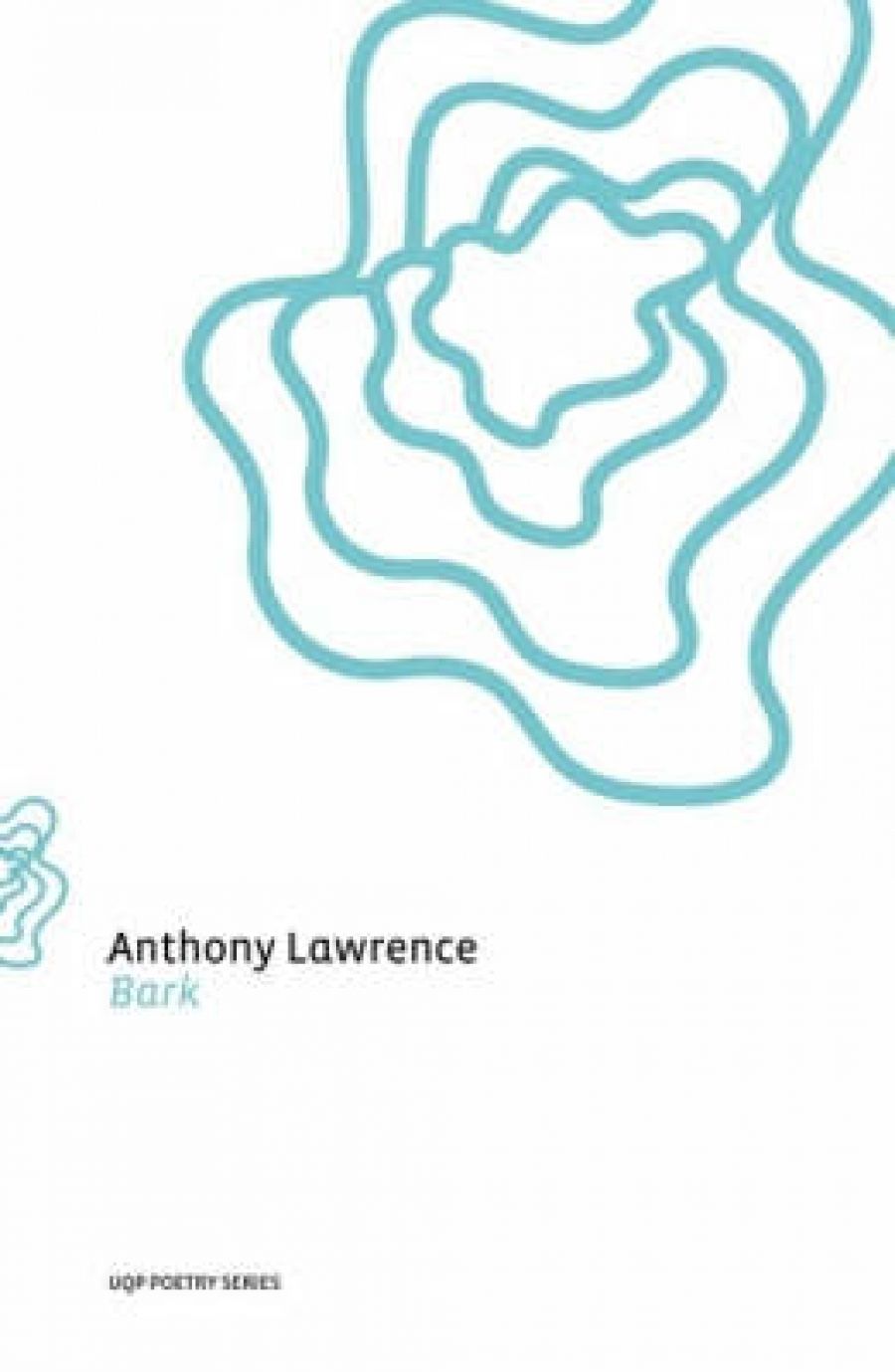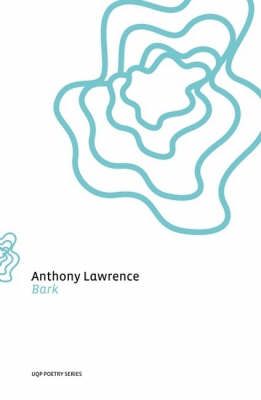
- Free Article: No
- Contents Category: Poetry
- Review Article: Yes
- Article Title: Staking all for revelation
- Online Only: No
- Custom Highlight Text:
Anthony Lawrence is a brilliant poet whose books are surprisingly uneven: this new volume, Bark, though, is a decided success. The best of his poems are usually those which are built around a confrontation between poet (carrying a fairly heavy backpack of personal trauma) and the natural world. This can be quite explicit, as in the fourth poem of a generally comic suite, ‘Bestiary in Open Tuning’, in which a ‘five metre white pointer / ... made a pass’ at the poet swimming in ‘over a thousand, sun-shafted feet / of Great Southern Ocean’. The double meaning of ‘made a pass’ is significant: there is an erotics involved here, as well as the simple evaluative movements of a predator.
- Book 1 Title: Bark
- Book 1 Biblio: UQP, $24.95 pb, 109 pp
- Book 1 Cover Small (400 x 600):

- Book 1 Cover (800 x 1200):

Both poems make the point that confrontation with the natural world is not the arena of heroics but of education. It is a kind of violent Wordsworthianism: subject and object must be in extreme mode before the interaction of education can take place. Bark is full of meditations about the drive to understand. The first of the poems I have been speaking of, ‘Hurricane House’, concludes with its protagonist ‘more alive / than he could remember, with the need to learn’. ‘The Grave of the Southpaw’ distinguishes between those who will ‘understand and be / overwhelmed before moving on’ and the rest whose equipment (in this poem, a compass and knife) will not help them in their search for the ‘faint register / of a heartbeat of imagination’.
There are a couple of, if not redeeming (for that is unnecessary), at least winning elements in these poems. One is humour. It is not something that one can imagine integrating easily into the kind of vision that I’ve been describing, but it is there. ‘What Has Fallen’ deals with the experience of animals and insects falling from the sky, and describes the author’s own experience of squid falling into his fishing boat. On the surface, this would be an opportunity to stress the marvellous, even the epiphanic, but the poem collapses on the wry note of one of the fishermen’s comments: ‘If I’d been an Old Testament prophet, / I’d have had something serious to say / about what just happened here.’ And I like the story told in ‘The Boat’ of the fishermen who, while anticipating the intense experiences of danger or of a gentler meeting with the miraculous creatures of the sea, find that the uninsured boat they are towing has sheered its tow-ball and shattered itself in the trees at the side of the road. Sometimes extreme experiences can be not only unpredictable but also humiliating.
Confrontation, of course, can bring its own poetic structure (very dramatic, very conclusion-oriented) and exclude others. There are attempts in Bark to structure poems in different ways, but Lawrence’s genius seems fixed in the highly dramatic. An important poem, ‘Guidance and Knowledge’ (shortlisted for the 2007 ABR Poetry Prize), begins by celebrating his father’s knowledge of wildlife but goes on to say, tellingly: ‘The truth is I am tired of poetry / and the pathology of its need to altar a scene.’
Not only are there poetic problems, there are also personal ones. It takes a heavy toll to operate at this level of intensity, and throughout the book there is an undercurrent of psychic distress. I think it is probably a good thing that this never becomes too explicit – I think Lawrence is too good a poet to become a confessionalist – but the reader constantly meets it. The poems refer regularly to serious psychiatric episodes, and a key word in the book is ‘reclusiveness’, a term which is mulled over in poems which seek to define it by differentiating it from other states. The first poem of the book, the not entirely successful ‘In the Shadows of a Rockspill’, concludes:
You will be captive to the constant
awful noise of reclusiveness
which is not solitude or absence
but simply another place you have entered
in order to leave
The unevenness of both Lawrence’s poems and his books comes as a result of wrestling with issues absolutely relevant to his conception of what poetry is. Overall, it is an impressive achievement and, although there can be a slightly cheesy, melodramatic quality in Lawrence’s work, there is no doubt that he succeeds more than he fails. The matching of poet and experience, brought to an intense pitch, brings him alive – as he tells us – but his best poems have a rare capacity to make us feel more alive too, more engaged with the landscapes in which we live. He is the only poet I know capable of making me bewail my own urban ignorance of the infinite complexity of the natural world.


Comments powered by CComment